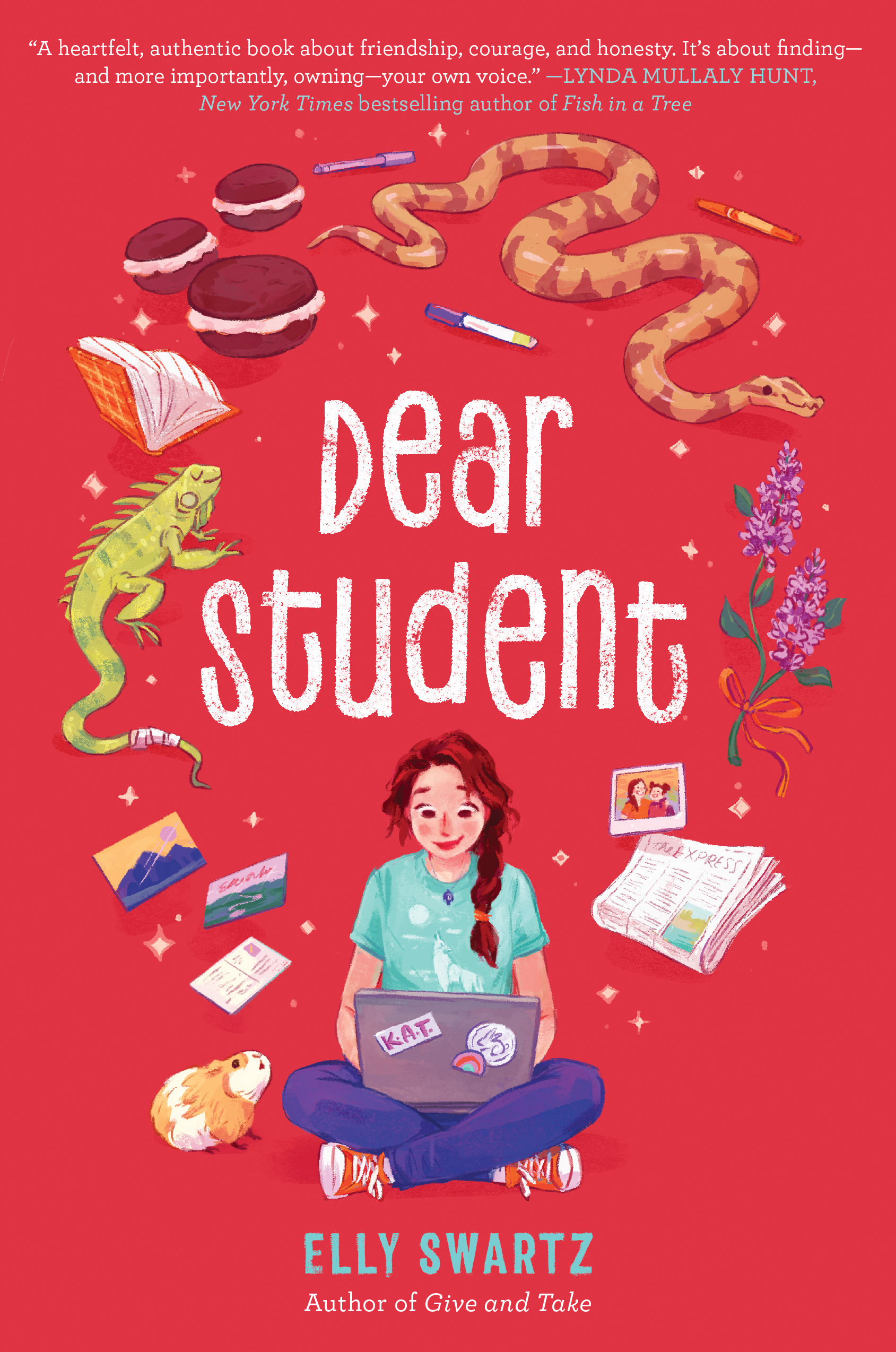 My new friend tucked her hair behind her ear as she whispered under her mask, “I have anxiety like Autumn in Dear Student.” Her voice shook. “Kids make fun of me.” She inhaled big. “Thanks for writing about someone like me.”
My new friend tucked her hair behind her ear as she whispered under her mask, “I have anxiety like Autumn in Dear Student.” Her voice shook. “Kids make fun of me.” She inhaled big. “Thanks for writing about someone like me.”
My heart melted.
I’d just spent the last fifty minutes talking to 200 sixth graders about Dear Student and Fearless Fred, the part of each of us that fear can’t boss around, and how I saw courage and strength in every one of them—even if they didn’t.
I told my new friend she was brave and strong. I told her she was special.
Dear Student is my newest book to fly into the world. And with every book I write, there are readers—young and old—who share their truths with me. My heart expands with every letter, whispered confession, and tearful exchange. Kids, teachers, and parents have confided that they connected with Autumn’s social anxiety, Molly’s OCD, Frankie’s grief, and Maggie’s hoarding. These readers shared with me, someone they just met, or in many instances, had never met.
I wondered why these friends were willing to reveal their hearts to me, how I had earned their confidence.
Then I realized it was the stories I wrote. These readers connected to my characters and their journeys, and they connected with me through them.
What a huge privilege it is to be trusted by my readers; to honor their experiences and respect their vulnerabilities.
What Matters to Me
In a recent interview about Dear Student, I was asked if I was on a crusade to make sure all kids with mental health challenges saw themselves on the page.
A crusade? Hmm. Was I?
Teachers and students always ask for writing advice, and the best advice I can give is to write from your heart; write what matters to you.
And making sure ALL kids feel seen, heard, and respected matters to me.
Making sure kids don’t feel alone matters to me.
Breaking down the stigmas and stereotypes surrounding mental health matters to me.
So, a crusade?
I’m going with yes.
We Are All Working on Something
I write about kids with mental health challenges because kids have mental health challenges. And with the pandemic came an increase in anxiety and other mental health disorders in our children1.
In Dear Student, you meet Autumn, who has social anxiety, and her pet guinea pig, Spud. Autumn becomes the secret voice of her middle school advice column. This story is not just about finding your voice but about owning it and using it.
I think we’re all a bit like Autumn. We all have moments where we wonder if we’re saying the right thing, wearing the right clothes, or acting the right way. Especially now—remote living, remote learning, masking, reentry. It’s all hard, exhausting, and sometimes scary.
The truth is, we are all working on something.
I talk to kids all over the country and ask them why they never told someone they were hurting and scared inside. These are the responses I’ve gotten:
I don’t want people to think I’m weird.
I don’t want kids to stop being friends with me.
I was embarrassed.
This is not okay with me.
I don’t want kids to feel shame about mental health.
I don’t want them to feel isolated.
I don’t want them to feel like they can’t talk about it.
Books Start Conversations
Books give kids the language, the distance, and the courage they need to talk about and understand the things that feel confusing, frightening, and embarrassing. They give kids the words they’re missing. Readers don’t always know what’s happening to them. It’s hard to describe what they don’t understand until they see themselves on the page. Then they find the words and the courage to reach out.
Books Heal and Connect
Books and the characters in them let kids know they’re not alone, even when they feel isolated and disconnected. I keep a letter tacked to the board next to my desk that a reader sent after finishing Finding Perfect. It begins like this: Dear Elly, I just want you to know that you changed my life. This reader shared that she did weird things like the main character Molly, was scared like Molly, told no one like Molly, and felt very alone—until she met Molly on the page. Then this brave reader reached out and told someone. Now she’s being treated for OCD and doing great.
Rudine Sims Bishop, author and professor emerita of education at the Ohio State University, introduced the idea that books can be windows, mirrors, and doors. Rudine is so right! When we see ourselves and learn about others, we can begin to break down the stigmas and stereotypes that stem from misunderstanding and ignorance. We can educate and teach. We can accept. And grow.
I believe this growth comes from the strength that lives in our hearts. We all have a Fearless Fred within us. In Dear Student, we learn that Fearless Fred is the part in each of us that fear can’t boss around. And when we find this courage, we find our voice and the strength to use it. To stand up for what we believe in. To connect. To empathize. To be kind.
Together
I may be on a crusade. But I am not alone.
For every story in every book, there’s a child who needs it. And for every child, there’s a devoted educator who knows that reader and gives them that book.
The impact educators have extends well beyond the school and the school year. It is a lasting imprint on the hearts and lives of their students.
I believe that we are at our best when we come together—authors, readers, and educators—to share books, open minds, and expand hearts.
References
1U.S. Surgeon General’s Advisory. (2021). Protecting youth mental health. Retrieved from hhs.gov/sites/default/files/surgeon-general-youth-mental-health-advisory.pdf






